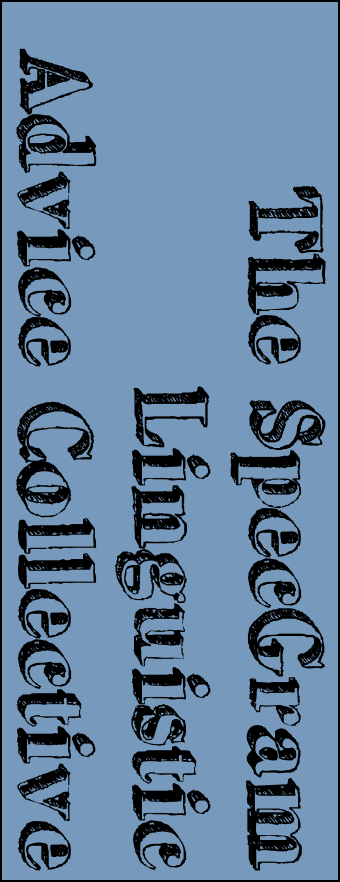


Are you in a world of linguistic hurt? The SpecGram Linguistic Advice Collective (SLAC) will offer you empirical, empathic, emphatic advice you can use!*

Remember, if you can tell the difference between good advice and bad advice, then you don’t need advice! So, if you need advice, trust us
Dear SLAC,
I recently told a theoretician of my acquaintance that a certain algorithm wasn’t optimal, as recursion led to performance issues. To my surprise, he flew into a rage, and unleashed the ripest sequence of negative-
Yours,
NLTK Monty
Dear Foul Monty,
While we cannot condone your colleague’s intemperate outburst, we can, perhaps, understand it. After all, recursion makes me swear over and over again. It plays havoc with my debugger.
—SLAC Unit #50657465
Dear Semi-
You may have spoken of the algorithm with non-
PS. Read this with derisive overtones.
—SLAC Unit #4d6164616c656e61
Dear Monty Hall,
From the wording of your question, I can tell that you have little experience with the ways of the Programming Subculture. They are some of the few, alongside the more prescriptive type of linguist, who care passionately about rules around semicolons and parentheses.
I would suggest that the best course of action to cure your acquaintance of his disposition would be to find a piece of software that randomly swaps parentheses for semicolons and vice versa while he types. At the very least, you will learn some new words.
—SLAC Unit #4a6f6e617468616e
Dear Serpent-
Did he use the words “mere” or “uninteresting” to describe performance at any point? If so, you should just give up hope and make new, less dogmatic acquaintances. Theoreticians believe their theories are psychologically real, up until the moment it is inconvenient for them to be seen making such a claim. You made the mistake of pointing out that his pet theory is not only psychologically implausible, it is psychologically impossible (and would likely cause a brain implementing it to overheat to the point of cooking itself). Who wants to hear, “your theory is essentially a recipe for murdering innocent native speakers”? No one.
From a bio-
While SLAC Unit #4a6f6e617468616e’s lack of concern about the proper rules of semicolon- and paren-
—SLAC Unit #54726579
Dear Monty-
I note with satisfaction that you have not attempted to elevate your relationship with said theoretician beyond the level of “acquaintance.” Do not attempt to do so. There is nothing you can do that does not offend them, all the more so if you naively express opinions regarding optimizing performance. No theoretician’s brain can consider both “performance” and “optimization” at the same time
—SLAC Unit #4b65697468
Dear Hannah,
You must remember that only because your acquaintance may be a theoretician and bearded this does not necessarily mean that he is a heapster, and simply assuming this of him may naturally cause offense. The misconception is surprisingly common, and I’m not surprised to hear his stack of tolerance over-
—SLAC Unit #466c6f7269616e
Why did that sound like the geekiest romantic novel since R-meo and Juli-
—SLAC Unit #4a6f6e617468616e
Dear NLTKM:
One should have learned by now that in discussing anything with theoreticians, it is wise never to bring up recurrent performance issues. It’s a touchy subject, and a besetting failing of the field.
—SLAC Unit #4d696b61656c
Dear Monty,
It should not come as a surprise to you that theoreticians seldom if ever are concerned with practice, as witness the popular formula “In theory P, but in practice Q”, where Q ⊃ ¬P.
It would be wise always to keep this in mind when speaking (writing, typing, telegraphing, signing, etc.) with a theoretician of any sort.
Beyond that, linguistic theoreticians aim their sights (and sites and cites) exclusively at competence, in the technical sense of the underlying mental aspect of language
—SLAC Unit #4d61726b
SLAC Unit #4d61726b speaketh the truth!
—SLAC Unit #4a6f6e617468616e
import NLTK
def response():
while alive(theoretician):
even if (his_algorithm < your_algorithm):
print "you are the best"
else:
response() —SLAC Unit #49736162656c6c65
import NLTK
class Theory:
substance = None
recursive = False
def __init__(self):
pass
class Academic:
born = False
dead = False
theory = None
def __init__(self):
self.born = True
def die(self):
self.dead = True
def is_alive(self):
return (self.born and not self.dead)
def accept_theory(self, theory):
self.theory = theory
class Theoretician(Academic):
def __init__(self):
super().__init__()
self.accept_theory(Theory())
self.theory.recursive = True
class Engineer(Academic):
def __init__(self):
super().__init__()
self.accept_theory(Theory())
self.theory.recursive = False
def handle_theoretician(self, theoretician):
while theoretician.is_alive():
if theoretician.theory.substance < self.theory.substance:
print("You're the best!")
else:
self.handle_theoretician(theoretician)
syntactician = Theoretician()
syntactician.theory.substance = 200
monty = Engineer()
monty.theory.substance = 167
assert syntactician.theory.substance is not None
assert monty.theory.substance is not None
assert syntactician is not Engineer
response = monty.handle_theoretician(syntactician)
print(response) —SLAC Unit #466c6f7269616e
SLAC Unit #466c6f7269616e,
RuntimeError: maximum recursion depth exceeded.
SLAC Unit #49736162656c6c65, I submit the following emendation:
def response():
ad_nauseam = True
while ad_nauseam:
even if (his.algorithm < your.algorithm):
print ("you are the best")
else:
response() —SLAC Unit #54656c
* Advice is not guaranteed to be useful, practical, or even possible. Do not attempt at home. Consult a doctor (of linguistics, philology, or
 |
The Dictionary of What Things Should Mean |
 |
Abjad- |
 |
SpecGram Vol CLXXXII, No 3 Contents |